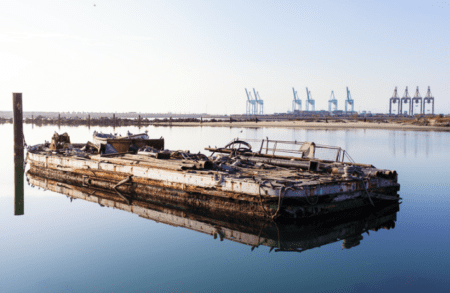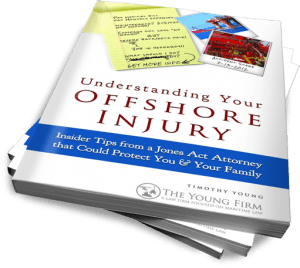Last Updated on April 14, 2025 by The Young Firm
Offshore injuries are a serious concern for workers in the maritime industry. The offshore environment can be hazardous, with workers facing risks such as equipment failures, falls, and exposure to harsh weather conditions. If you’re an injured offshore worker, you may be entitled to compensation for your losses, including medical expenses, lost wages, and pain and suffering. An experienced attorney can handle various offshore injury cases, ensuring a dedicated attorney-client relationship that addresses your unique situation with expertise and care.
The impact of offshore injuries on the family can be profound, making legal recourse helpful for families of offshore workers who are struggling with the loss or significant injury of a loved one. If you or a loved one has been injured while working offshore, it is essential to educate yourself on your rights or seek the advice of a qualified offshore injury lawyer who can guide you through the legal process.
An Introduction to Maritime Law and Regulations
Maritime law and regulations play a crucial role in protecting the rights of offshore workers. The Jones Act, also known as the Merchant Marine Act of 1920, is a federal law that provides protections for offshore workers who are injured on the job. This law allows injured workers to seek compensation for their losses, including medical expenses, lost wages, and pain and suffering. Experienced offshore injury attorneys understand the complexities of maritime law and can help injured workers navigate the claims process.
In addition to the Jones Act, other laws and regulations, such as the Longshore and Harbor Workers’ Compensation Act, also provide protections for various maritime workers. These laws ensure that injured workers receive the compensation they deserve, no matter what. Maritime lawyers can help injured workers understand their rights and options under these laws, ensuring they receive the support they need during a challenging time.
I’ve Suffered an Offshore Accident – Do I have a Maritime Claim?
If your offshore injury was caused by negligence, you have a maritime claim under the Jones Act. Here are the different ways that negligence may have played a role in your accident.
Unsafe Work Environment
Unsafe work environments are often cited by injured workers as the cause of their offshore accident. The environment is unsafe if you did not have access to proper safety equipment or protective gear, were not trained properly, or did not have an adequate number of crew members. These are just a few examples of what may constitute as an unsafe work environment. If you’re still not sure, an offshore injury lawyer will review your case for free.
Unseaworthiness
An unseaworthiness claim is filed when your unsafe work environment is limited to the improper upkeep of the vessel. Jack-up rigs, for example, must be properly maintained to avoid unseaworthiness. Things like unfit living conditions, old or broken equipment (such as a ladder in need of repair), and inadequate medical supplies may all be considered under an unseaworthiness claim.
Third Party Negligence
You can file ‘third party’ claims against any company that did anything wrong that may have caused or contributed to your offshore accident. This generally means two things:
claims against companies that actively did something wrong
claims against companies that designed something improperly or failed to maintain something properly on your platform.
If your injury was caused by a third party, they should be held accountable for their negligence. With an experienced offshore accident attorney, you have a much better chance of winning against even the largest companies in the maritime industry.
Types of Offshore Injuries and Accidents
Offshore workers are at risk of suffering a wide range of injuries and accidents, including falls, equipment failures, and exposure to hazardous chemicals. Offshore workers may suffer from serious injuries such as traumatic brain injuries, spinal cord injuries, and even death. Other types of offshore injuries and accidents include slips and falls, crushing injuries, and work-related illness.
By understanding the types of offshore injuries and accidents, injured workers can better prepare themselves and seek the necessary legal assistance to secure their future.
What is the Jones Act? How Does it Apply to Offshore Workers?
If you’re an offshore worker, you may have heard about the Jones Act. It’s a federal law that protects offshore workers who suffer injuries due to the negligence of their employers or fellow crew members. It allows them to pursue compensation for their medical expenses, lost income, and other damages.
The Jones Act is one of several maritime laws that protect offshore workers. These specialized laws are crucial in legal claims for injuries sustained at sea, ensuring that experienced maritime attorneys can navigate them effectively to secure maximum compensation for their clients.
The Jones Act almost always applies to offshore workers. To be eligible, you must be a seaman who spends at least 30% of your time on a vessel. Vessels are broadly defined under the Jones Act, and include barges, oil rigs, and just about any other floating platform.
To file a successful Jones Act claim, you must prove that the negligence of your employer or a fellow crew member caused your injuries. Negligence can include unsafe working conditions, failure to provide proper training or equipment, or failure to maintain the vessel safely.
One of the key benefits of a Jones Act claim is that it provides seamen with a greater level of protection and compensation than other types of claims. Unlike traditional workers’ compensation claims, which provide limited benefits to injured workers, a Jones Act claim allows seamen to seek compensation for their full range of damages, including pain and suffering, mental anguish, and punitive damages in rare instances.
What if Negligence Didn’t Cause the Offshore Injury?
Whether or not your injury was caused by negligence, your employer is responsible for paying a certain sum to ensure that you are able to recover until you can return to work. This is called Maintenance and Cure, and it requires your company to take care of both your living expenses and medical expenses until you’ve reached “maximum medical improvement.”
If your employer or insurance company is not paying your medical bills in full, or is giving you a stipend that does not cover your full living expenses (rent, utilities, food), then you can file a maintenance and cure claim. They will not only have to pay the medical costs and living costs that they owe you, but they will likely have to pay punitive damages as well.
Understanding Your Options After an Offshore Accident
If you would like as much information as possible, please order our FREE book, ‘Understanding Your Offshore Injury.’ You will get more than 50 pages of important rules and laws under the Jones Act and maritime law. We will mail this to you free of cost to help you better understand maritime injury law.
This book discusses detailed aspects of offshore injuries law, and answers dozens of commonly asked questions about offshore injury and maritime injury claims. Our experienced offshore injury lawyers, known for handling complex maritime legal cases, will help you navigate the laws you’re learning about.
Simply fill out the form below and we will immediately mail you our book. There is no charge at all to you.
If you’d prefer to speak immediately with an offshore injury attorney, reach out to us at The Young Firm. We believe in helping injured offshore workers understand their rights, no matter what kind of accident occurred. Our commitment to fighting for the rights of injured offshore workers is unwavering.
Our offshore injury attorneys offer free consultations, so that you don’t have to add confusion to the challenges you face after a serious injury.





